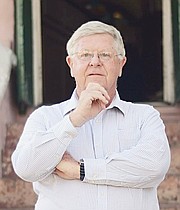By Dr MIKE NEVILLE
THERE is great concern that in the Arctic, polar bears are becoming an endangered species.
I wish the same were true of bipolar disorder, but far from vanishing it is either increasing or the recognition of the illness is improving as we become more aware of its existence. Climate change deniers and mental illness naysayers still clamour for attention but the scientific facts are real and bipolar disorder affects about 1 per cent of all the people of the world. This means that about 3,500 Bahamians have this illness.
It used to be called manic depressive illness and the names describe this switch of mood from pole to pole, mania to severe depression. People with this illness can change from feelings of extreme happiness and energy to suicidal despair. The depression can be unbearable and anything to stop the suffering seems acceptable. A four-decade-long study in Denmark showed a suicide rate of 0.7 per cent for the whole country but an 8 per cent suicide rate for those suffering from bipolar disorder. The level of depression is so severe that thinking becomes delusional with strange beliefs of paranoia, guilt and worthlessness. I treated a lady who had tried to end it all as she believed that she had promised the church one pound forty years earlier and needed to go to “hell” as she never given the church her money.
The switch into mania is dramatic with high energy levels, insomnia, rapid speech, ideas rapidly changing, sexual disinhibition and grandiose delusions. They are usually very happy but this can change into paranoid anger if anyone tries to oppose them. I used to visit prisons in Manchester when I was training in forensic psychiatry, on one occasion the prison officer told me it would be better to interview my client through the peep hole in the strip cell as they had him completely stripped on a suicide watch. He had also managed to jump up, grab the light bulb and eat it! I assessed that he was manic and asked to be let in to continue the interview; after a while I asked him had he eaten the light bulb.
“Sure,” he responded .“I wanted a light breakfast.”
I laughed with him; the officers never treated me the same after that incident.
It is fine to laugh with patients but never to laugh at them.
The illness seems to run in families so it has a genetic vulnerability which is triggered by life’s events; exactly what we do not know. It has been gaining recognition if not acceptability as numbers of famous celebrities have openly discussed their battles with the illness. Catherine Zeta Jones and Kurt Cobain (a creative genius who died by suicide age 27) have been diagnosed as suffering from bipolar disorder.
Some of the great British comedians like Stephen Fry, John Cleese and Spike Milligan have written and spoken extensively about their experiences with the illness. They describe periods of comedic brilliance and attempts to leave this place with suicide the only apparent option. It disturbs me greatly that some religions are still unable to accept that death by suicide in the midst of a delusional depression is no different from death from cancer or a heart attack, the illness, not moral decadence is the root cause.
Bipolar disorder is treatable, the main aim is to restore balance so whilst we all have mood swings therapy tries to lesson the dramatic polar swings. It is important to restore balance to life; be calm, reduce stress, avoid substance abuse, exercise and stable diets all help.
Mindfulness, cognitive behaviour therapy all help but most people will also need medication; many will have already tried self medication with alcohol and drugs often making matters worse.
Lithium for many years was the drug of choice and despite many complications of the drug, it saved lives. There is now a move towards anticonvulsant medication, drugs that were developed to prevent seizures help prevent these mood swings as well and generally have a less damaging side effect profile.
• Dr Mike Neville is a forensic psychiatrist who has practised for more than 40 years in The Bahamas, working at Sandilands, the prison and in private practice. Send comments and responses to mneville@tribunemedia.net.





Comments
Use the comment form below to begin a discussion about this content.
Sign in to comment
OpenID